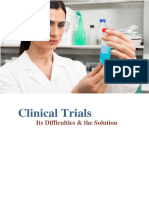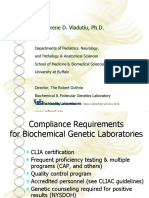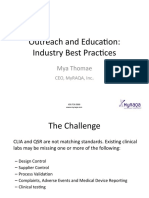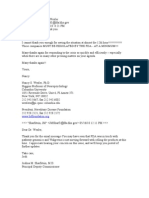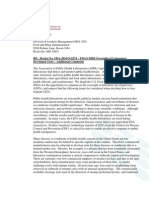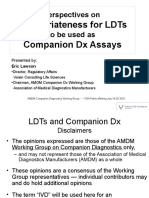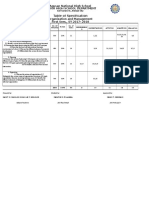0 ratings0% found this document useful (0 votes)
30 viewsFDA/CDHR Public Meeting: Oversight of Laboratory Developed Tests (Direct-to-Consumer Testing)
FDA/CDHR Public Meeting: Oversight of Laboratory Developed Tests (Direct-to-Consumer Testing)
Uploaded by
fdablogThe document discusses direct-to-consumer (DTC) genetic testing and the American Society for Clinical Pathology's (ASCP) concerns. The ASCP believes that for optimal patient health outcomes, patients who receive DTC tests should review results with their physicians and use CLIA-certified laboratories. An appropriate regulatory framework is needed to protect patients while encouraging testing innovation. All medical tests, regardless of complexity, should undergo review before patient use.
Copyright:
Attribution Non-Commercial (BY-NC)
Available Formats
Download as PPS, PDF, TXT or read online from Scribd
FDA/CDHR Public Meeting: Oversight of Laboratory Developed Tests (Direct-to-Consumer Testing)
FDA/CDHR Public Meeting: Oversight of Laboratory Developed Tests (Direct-to-Consumer Testing)
Uploaded by
fdablog0 ratings0% found this document useful (0 votes)
30 views9 pagesThe document discusses direct-to-consumer (DTC) genetic testing and the American Society for Clinical Pathology's (ASCP) concerns. The ASCP believes that for optimal patient health outcomes, patients who receive DTC tests should review results with their physicians and use CLIA-certified laboratories. An appropriate regulatory framework is needed to protect patients while encouraging testing innovation. All medical tests, regardless of complexity, should undergo review before patient use.
Original Title
FDA-2010-N-0274-0063.2
Copyright
© Attribution Non-Commercial (BY-NC)
Available Formats
PPS, PDF, TXT or read online from Scribd
Share this document
Did you find this document useful?
Is this content inappropriate?
The document discusses direct-to-consumer (DTC) genetic testing and the American Society for Clinical Pathology's (ASCP) concerns. The ASCP believes that for optimal patient health outcomes, patients who receive DTC tests should review results with their physicians and use CLIA-certified laboratories. An appropriate regulatory framework is needed to protect patients while encouraging testing innovation. All medical tests, regardless of complexity, should undergo review before patient use.
Copyright:
Attribution Non-Commercial (BY-NC)
Available Formats
Download as PPS, PDF, TXT or read online from Scribd
Download as pps, pdf, or txt
0 ratings0% found this document useful (0 votes)
30 views9 pagesFDA/CDHR Public Meeting: Oversight of Laboratory Developed Tests (Direct-to-Consumer Testing)
FDA/CDHR Public Meeting: Oversight of Laboratory Developed Tests (Direct-to-Consumer Testing)
Uploaded by
fdablogThe document discusses direct-to-consumer (DTC) genetic testing and the American Society for Clinical Pathology's (ASCP) concerns. The ASCP believes that for optimal patient health outcomes, patients who receive DTC tests should review results with their physicians and use CLIA-certified laboratories. An appropriate regulatory framework is needed to protect patients while encouraging testing innovation. All medical tests, regardless of complexity, should undergo review before patient use.
Copyright:
Attribution Non-Commercial (BY-NC)
Available Formats
Download as PPS, PDF, TXT or read online from Scribd
Download as pps, pdf, or txt
You are on page 1of 9
FDA/CDHR Public Meeting:
Oversight of Laboratory Developed Tests
(Direct-to-Consumer Testing)
Kenneth Emancipator, MD, FASCP
Officer and Member of the ASCP Executive Committee
July 19-20, 2010
Direct-to-Consumer Testing
(DTC)
DTC, particularly as it relates to genetic
testing, is an area of growing concern to
the American Society for Clinical Pathology
(ASCP).
ASCP is a patient-centered organization
committed to optimizing patient health
outcomes.
To Ensure Optimal Health Outcomes:
Patients choosing DTC tests marketed and sold in DTC
commercial transactions should review results with their
physicians and utilize CLIA certified laboratories.
Appropriate regulatory framework for DTC testing must
simultaneously protect patient health while fostering an
environment that encourages the innovation of more advanced
testing technology.
All test devices, regardless of their level of complexity or of the
qualifications of person performing the test, should be
reviewed before their use on or by patients.
Claims of clinical validity for all testing devices should be
established in an environment similar to that which they are
intended.
Direct-to-Consumer: A New Paradigm
Traditionally, physicians have been responsible
for ordering diagnostic tests on their patients.
Today, the rapid developments in genetic testing
technology and the emergence of personal
genome testing companies have created
increasing opportunity for patients to become
more involved in their health care.
Proponents of DTC testing argue that it provides
patients risk assessment information and allows
patients to proactively search for specific genetic
variants of interest.
Direct-to-Consumer Issues
DTC presents a myriad of issues, not only for patients,
but also for clinical laboratories, physicians, and
insurance companies.
Issues include, but are not limited to:
• Medical implications such as patient understanding of
the test results.
• The analytic validity, clinical validity, and clinical utility
of the DTC genetic tests in the market today.
• The legal implications and liability of DTC testing.
Concern: DTC testing will generate undue stress and
the “worried well” – individuals who over-interpret their
test results.
ASCP Recommendations
Laboratories performing DTC should provide
patients undergoing testing with easy to
comprehend test results.
• Make available to the patient pre-testing information
(e.g., the need for fasting, eating or drinking, effect of
specific medications, etc.)
For optimum patients health outcomes,
patients should consult with their physician for
proper interpretation of the test results.
• Clinicians may have access to the patient’s family
history and other data that can critically affect test
interpretation.
DTC Clinical Value
Currently, the clinical value of most DTC
genetic tests remain unproven.
• The presence of particular genomic variant in a
given individual, though statistically significant,
may not necessarily mean that it is clinically
meaningful.
• There are little or no data on the outcomes of
these tests.
Laws and regulations regarding DTC testing
vary by state, therefore, each laboratory
performing such tests must operate in
accordance with federal and state law.
ASCP believes that it is important for
physicians and patients to use DTC test
results as a mechanism to discuss a
variety of health-related issues and future
laboratory testing needs if necessary.
It is essential that patients who choose to
engage in DTC testing select a CLIA
certified laboratory and have their test
results reviewed by their primary care
physician.
Thank You.
You might also like
- A History of English Language Teaching Second EditionDocument4 pagesA History of English Language Teaching Second EditionEdith Casarrubias LopezNo ratings yet
- Clinical Trial DesignsDocument18 pagesClinical Trial DesignsVenkatesh Gavini100% (1)
- Week 1 PDFDocument41 pagesWeek 1 PDFRaghul BaskaranNo ratings yet
- July 19-20, 2010Document3 pagesJuly 19-20, 2010fdablogNo ratings yet
- CDC Good Laboratory Practices For Molecular Genetic Testing For Heritable DiseasesDocument41 pagesCDC Good Laboratory Practices For Molecular Genetic Testing For Heritable DiseasesRodolfo VelazcoNo ratings yet
- Association For Molecular PathologyDocument4 pagesAssociation For Molecular PathologyfdablogNo ratings yet
- Point of Care DiagnosticsDocument109 pagesPoint of Care Diagnosticschhatra0% (1)
- Hot Topic in LM POCTDocument14 pagesHot Topic in LM POCTHumaira RashidNo ratings yet
- RT 303 Prelim NotesDocument26 pagesRT 303 Prelim NotesNikko L. PescuesoNo ratings yet
- Real-World Evidence: A Better Life Journey For Pharmas, Payers and PatientsDocument5 pagesReal-World Evidence: A Better Life Journey For Pharmas, Payers and PatientsCognizantNo ratings yet
- Opening RemarksDocument3 pagesOpening RemarksfdablogNo ratings yet
- Multi-Cancer Early Detection: Incorporating Blood-Based Screening Tools into Primary Care PracticeFrom EverandMulti-Cancer Early Detection: Incorporating Blood-Based Screening Tools into Primary Care PracticeNo ratings yet
- Clinical Practice Improvement and Redesign How Change in Workflow Can Be Supported by CDSDocument42 pagesClinical Practice Improvement and Redesign How Change in Workflow Can Be Supported by CDSwmhoggNo ratings yet
- FDA Public Meeting On Laboratory Developed Tests July 19, 2010Document3 pagesFDA Public Meeting On Laboratory Developed Tests July 19, 2010fdablogNo ratings yet
- Arnold Ventures FDA Draft Guidance DCT Aug 2023Document3 pagesArnold Ventures FDA Draft Guidance DCT Aug 2023Arnold VenturesNo ratings yet
- Pan American Society For Clinical Virology Position Statement On Fda Oversight of Laboratory-Developed Tests (LDTS)Document5 pagesPan American Society For Clinical Virology Position Statement On Fda Oversight of Laboratory-Developed Tests (LDTS)fdablogNo ratings yet
- DI - Intelligent Clinical TrialsDocument36 pagesDI - Intelligent Clinical TrialsPKNo ratings yet
- Informed Consent FormDocument3 pagesInformed Consent FormNazaqat FarooqNo ratings yet
- FDA Oversight of Laboratory Developed Tests Docket Number FDA-2010-N-0274Document2 pagesFDA Oversight of Laboratory Developed Tests Docket Number FDA-2010-N-0274fdablogNo ratings yet
- DTC Genetic Testing Version 2.0Document7 pagesDTC Genetic Testing Version 2.0alexprodi28No ratings yet
- Clinicaltrialsbooklet WebDocument5 pagesClinicaltrialsbooklet Webzberger1087No ratings yet
- Quality Improvement in Clinical LaboratoDocument10 pagesQuality Improvement in Clinical LaboratoJuly K - APFCB JulyK100% (1)
- Georgirene D. Vladutiu, PH.DDocument9 pagesGeorgirene D. Vladutiu, PH.DfdablogNo ratings yet
- Utilizing Point-Of-Care Testing To Optimize Patient Care - PMCDocument5 pagesUtilizing Point-Of-Care Testing To Optimize Patient Care - PMCRegina GarciaNo ratings yet
- Ss Application To HealthcareDocument47 pagesSs Application To HealthcareNOORUDDINNo ratings yet
- Perspective: Comparative Effectiveness: Asking The Right Questions, Choosing The Right MethodDocument5 pagesPerspective: Comparative Effectiveness: Asking The Right Questions, Choosing The Right MethodamkroegeNo ratings yet
- Medical Policy - Coverage of Routine Services Associated With Clinical TrialsDocument12 pagesMedical Policy - Coverage of Routine Services Associated With Clinical TrialsKyle Wendl PaatNo ratings yet
- Drug Development ProcessapolloDocument19 pagesDrug Development Processapollotamara_0021No ratings yet
- Clinical Trials Thesis TopicsDocument4 pagesClinical Trials Thesis Topicsshannonjoyarvada100% (2)
- White Paper On Cell Gene Therapy Ver2 FINALDocument14 pagesWhite Paper On Cell Gene Therapy Ver2 FINALBüşra GNo ratings yet
- Clinic Laboratory - Activ Participant in Clinical Trials - : Cristina Florescu Moraid MD, Msc. EurclinchemDocument55 pagesClinic Laboratory - Activ Participant in Clinical Trials - : Cristina Florescu Moraid MD, Msc. EurclinchemmNo ratings yet
- Leering University Healthcare StrategyDocument18 pagesLeering University Healthcare Strategychuff6675No ratings yet
- Health Information TechnologyfinalDocument8 pagesHealth Information TechnologyfinalFranzia Izandra Alkuino Mojica100% (1)
- Evidence Based Medication General Guidelines For Clinical Pharmacy PracticeDocument10 pagesEvidence Based Medication General Guidelines For Clinical Pharmacy PracticeMahum SohailNo ratings yet
- Value of Clinical Laboratory Services in Health CareDocument4 pagesValue of Clinical Laboratory Services in Health Careapi-280296463No ratings yet
- Preimplantation Genetic Testing: Coverage RationaleDocument15 pagesPreimplantation Genetic Testing: Coverage Rationaletoni10juanNo ratings yet
- Test Interpretation Station CINNAMONDocument7 pagesTest Interpretation Station CINNAMONSusan Tyler-FreerNo ratings yet
- Pharmaceutical MarketingDocument84 pagesPharmaceutical MarketingVijay Kumar40% (5)
- Good Clinical Practice Guidelines IndiaDocument4 pagesGood Clinical Practice Guidelines IndiaMonica0% (1)
- Chair, Department of Laboratory Medicine and Pathology, Mayo Clinic President and Chief Executive Officer, Mayo Medical LaboratoriesDocument2 pagesChair, Department of Laboratory Medicine and Pathology, Mayo Clinic President and Chief Executive Officer, Mayo Medical LaboratoriesfdablogNo ratings yet
- 05 CureTip - CompetitionDocument4 pages05 CureTip - CompetitionMarvin SisNo ratings yet
- Diagnostic Devices With Microfluidics: Francesco KrzysztofDocument14 pagesDiagnostic Devices With Microfluidics: Francesco KrzysztofSidrra SiNo ratings yet
- Intermountain HealthcareDocument21 pagesIntermountain HealthcareGaurav AcharyaNo ratings yet
- The Benefits and Challenges of Conducting Clinical Trials: Sharon Jameson, RN, BSN, MBADocument5 pagesThe Benefits and Challenges of Conducting Clinical Trials: Sharon Jameson, RN, BSN, MBAdrmansimbNo ratings yet
- 6931-Article Text-95227-2-10-20240125Document10 pages6931-Article Text-95227-2-10-20240125pulismanagementNo ratings yet
- Electronic Health Record EHR Data Modernizing The Pharmaceutical Research ProcessDocument12 pagesElectronic Health Record EHR Data Modernizing The Pharmaceutical Research ProcessHainah Kariza LeusNo ratings yet
- Laboratory Co MplianceDocument56 pagesLaboratory Co MplianceSarah AhmedNo ratings yet
- FDA/CDRH Public Meeting: Oversight of Laboratory Developed Tests - Patient ConsiderationsDocument8 pagesFDA/CDRH Public Meeting: Oversight of Laboratory Developed Tests - Patient ConsiderationsfdablogNo ratings yet
- Career Opportunities in Clinical ResearchThat Is A Change That Was Long in Coming.Document3 pagesCareer Opportunities in Clinical ResearchThat Is A Change That Was Long in Coming.Anushree ReddyNo ratings yet
- Pharm Info LecDocument5 pagesPharm Info LecTrixie Nichole LaraNo ratings yet
- Practical Clinical Trials: Increasing The Value of Clinical Research For Decision Making in Clinical and Health PolicyDocument9 pagesPractical Clinical Trials: Increasing The Value of Clinical Research For Decision Making in Clinical and Health PolicyJim MorrisonNo ratings yet
- The Impact of Health Information Technology On Patient SafetyDocument13 pagesThe Impact of Health Information Technology On Patient SafetySaba Abu FarhaNo ratings yet
- State-of-the-Art Diagnosis and Treatment of Hypertension in PregnancyDocument14 pagesState-of-the-Art Diagnosis and Treatment of Hypertension in PregnancyarifuadNo ratings yet
- Lec - 4 - Clinical Decision Support SystemDocument15 pagesLec - 4 - Clinical Decision Support SystemMohammad HamidNo ratings yet
- JCI Newsletter May 8 IPSGDocument6 pagesJCI Newsletter May 8 IPSGAhmad HaririNo ratings yet
- Healthtechnology 161001125856Document32 pagesHealthtechnology 161001125856Namita BatraNo ratings yet
- Patient Engagement in Clinical Trials Survey ReportDocument23 pagesPatient Engagement in Clinical Trials Survey ReportAlessandra BendoNo ratings yet
- Clinical Trials Its Difficulties and The SolutionDocument8 pagesClinical Trials Its Difficulties and The SolutionSmartway PharmaceuticalsNo ratings yet
- PGX TestingDocument51 pagesPGX TestingHashim KhanNo ratings yet
- Oncotype NICEDocument62 pagesOncotype NICEELAINENo ratings yet
- Early Cancer Detection in Primary Care: Are You Aware of New Blood-Based Multi-Cancer Screening ToolsFrom EverandEarly Cancer Detection in Primary Care: Are You Aware of New Blood-Based Multi-Cancer Screening ToolsNo ratings yet
- Comments On Regulating LDTDocument2 pagesComments On Regulating LDTfdablogNo ratings yet
- Mary Del Brady Chairman & Ceo, Cvergenx, Inc. Advisor & Founding Ceo, Redpath Integrated Pathology, Inc. Member, Steering Committee, Coalition For 21 Century MedicineDocument4 pagesMary Del Brady Chairman & Ceo, Cvergenx, Inc. Advisor & Founding Ceo, Redpath Integrated Pathology, Inc. Member, Steering Committee, Coalition For 21 Century MedicinefdablogNo ratings yet
- Small Business Developed Innovative Tests: A Proposed Regulatory Exemption ForDocument4 pagesSmall Business Developed Innovative Tests: A Proposed Regulatory Exemption ForfdablogNo ratings yet
- Agendia - Dr. Bernhard Sixt, CeoDocument1 pageAgendia - Dr. Bernhard Sixt, CeofdablogNo ratings yet
- Chair, Department of Laboratory Medicine and Pathology, Mayo Clinic President and Chief Executive Officer, Mayo Medical LaboratoriesDocument2 pagesChair, Department of Laboratory Medicine and Pathology, Mayo Clinic President and Chief Executive Officer, Mayo Medical LaboratoriesfdablogNo ratings yet
- Georgirene D. Vladutiu, PH.DDocument8 pagesGeorgirene D. Vladutiu, PH.DfdablogNo ratings yet
- Outreach and Education: Industry Best Practices: Mya ThomaeDocument11 pagesOutreach and Education: Industry Best Practices: Mya ThomaefdablogNo ratings yet
- Fda 2010 N 0274 0060.1Document2 pagesFda 2010 N 0274 0060.1fdablogNo ratings yet
- FDA Public Meeting On Laboratory Developed Tests July 19, 2010Document3 pagesFDA Public Meeting On Laboratory Developed Tests July 19, 2010fdablogNo ratings yet
- FDA/CDRH Public Meeting: Oversight of Laboratory Developed Tests - Patient ConsiderationsDocument8 pagesFDA/CDRH Public Meeting: Oversight of Laboratory Developed Tests - Patient ConsiderationsfdablogNo ratings yet
- From: To: Date: SubjectDocument4 pagesFrom: To: Date: SubjectfdablogNo ratings yet
- Laboratory Developed TestsDocument10 pagesLaboratory Developed TestsfdablogNo ratings yet
- Opening RemarksDocument3 pagesOpening RemarksfdablogNo ratings yet
- Georgirene D. Vladutiu, PH.DDocument9 pagesGeorgirene D. Vladutiu, PH.DfdablogNo ratings yet
- About Genomic Health, Inc.: Genomic Health Is Committed To Prolonging and Enhancing The Lives of Patients With CancerDocument7 pagesAbout Genomic Health, Inc.: Genomic Health Is Committed To Prolonging and Enhancing The Lives of Patients With CancerfdablogNo ratings yet
- Oversight of LDTS: Clinical Laboratory Challenges: Liz Lison, Advocea, LLCDocument9 pagesOversight of LDTS: Clinical Laboratory Challenges: Liz Lison, Advocea, LLCfdablogNo ratings yet
- TH THDocument2 pagesTH THfdablogNo ratings yet
- Pan American Society For Clinical Virology Position Statement On Fda Oversight of Laboratory-Developed Tests (LDTS)Document5 pagesPan American Society For Clinical Virology Position Statement On Fda Oversight of Laboratory-Developed Tests (LDTS)fdablogNo ratings yet
- RE: Docket No. FDA-2010-N-0274 - FDA/CDRH Oversight of Laboratory Developed Tests - Additional CommentsDocument3 pagesRE: Docket No. FDA-2010-N-0274 - FDA/CDRH Oversight of Laboratory Developed Tests - Additional CommentsfdablogNo ratings yet
- Appropriateness For Ldts Companion DX Assays: Perspectives On To Be Used AsDocument16 pagesAppropriateness For Ldts Companion DX Assays: Perspectives On To Be Used AsfdablogNo ratings yet
- FDA Oversight of Laboratory Developed Tests Docket Number FDA-2010-N-0274Document2 pagesFDA Oversight of Laboratory Developed Tests Docket Number FDA-2010-N-0274fdablogNo ratings yet
- Fda Regulation: Lab Developed Tests (LDTS) : Ted SnelgroveDocument6 pagesFda Regulation: Lab Developed Tests (LDTS) : Ted SnelgrovefdablogNo ratings yet
- Slides Project 4 Week 3Document9 pagesSlides Project 4 Week 3KARYNo ratings yet
- Self-Esteem Therapy: 24 Activities and Techniques For Your PracticeDocument16 pagesSelf-Esteem Therapy: 24 Activities and Techniques For Your PracticeNadeem IqbalNo ratings yet
- CERTDocument18 pagesCERTJERWIN SAMSONNo ratings yet
- Generative AI Meets 3D: A Survey On Text-to-3D in AIGC EraDocument14 pagesGenerative AI Meets 3D: A Survey On Text-to-3D in AIGC Eraklaus peterNo ratings yet
- BSc-Phys-Hon-CBCS (2020) PDFDocument139 pagesBSc-Phys-Hon-CBCS (2020) PDFBikash DeyNo ratings yet
- Econometrics Word FileDocument13 pagesEconometrics Word FileRabeya AktarNo ratings yet
- ATTY. MARILYN BUGARIN BARUA YAP Guest Speaker Introduction by Samuel Baltazar BataraDocument2 pagesATTY. MARILYN BUGARIN BARUA YAP Guest Speaker Introduction by Samuel Baltazar BataraSamu Bata93% (42)
- Legal News Writer Brochure:: The Main Motive of ADocument3 pagesLegal News Writer Brochure:: The Main Motive of AGaurav pratapNo ratings yet
- Product Oriented Performance Based AssessmentDocument2 pagesProduct Oriented Performance Based AssessmentSean venice Encarnacion100% (1)
- NCSSM Magazine Volume 8Document40 pagesNCSSM Magazine Volume 8amplourde3106No ratings yet
- ELS 108 P SyllabusDocument29 pagesELS 108 P SyllabusChimon LoveNo ratings yet
- Percentage Mathematics For Entry Test of PPSC, FPSC, NTS, PMS, CSS and Other Test Systems PDFDocument5 pagesPercentage Mathematics For Entry Test of PPSC, FPSC, NTS, PMS, CSS and Other Test Systems PDFShafique Khaskheli100% (2)
- Application Form ICDF PDFDocument2 pagesApplication Form ICDF PDFAnton Thon BotaxNo ratings yet
- Global Marketing Strategy: Hammad AshrafDocument22 pagesGlobal Marketing Strategy: Hammad AshrafZubair YounasNo ratings yet
- Yss Syllabus PDFDocument3 pagesYss Syllabus PDFkavshalNo ratings yet
- Grade - 8 ChecklistDocument12 pagesGrade - 8 ChecklistMarycon MaapoyNo ratings yet
- 22-12-2022 - Sr.2Hrs Prog. (ICON & MEDICON) - CBSE - BOARD - PHASE-2 - ENGLISH - Q.PaperDocument15 pages22-12-2022 - Sr.2Hrs Prog. (ICON & MEDICON) - CBSE - BOARD - PHASE-2 - ENGLISH - Q.PaperSameena LoniNo ratings yet
- 3rd Activity Sir MarkDocument3 pages3rd Activity Sir MarkMark Nel Venus0% (1)
- TOS Organization and ManagementDocument2 pagesTOS Organization and ManagementRandyl Medina Fernandez90% (10)
- Soham LolageDocument1 pageSoham LolagepranavNo ratings yet
- Excellent 20 Pts Good 15 Pts Fair 10 Pts Poor 5 PTS: ContentDocument1 pageExcellent 20 Pts Good 15 Pts Fair 10 Pts Poor 5 PTS: ContentVersoza NelNo ratings yet
- September Datesheet 2023Document2 pagesSeptember Datesheet 2023kumar483725No ratings yet
- CV (Nayem) NewpdfDocument1 pageCV (Nayem) NewpdfNaim UddinNo ratings yet
- Biblio TherapyDocument5 pagesBiblio TherapyMuhammad TaufiqNo ratings yet
- Taxonomy in The Affective DomainDocument10 pagesTaxonomy in The Affective DomainNaomie MacarandanNo ratings yet
- General Science Ebook SSBCrack NodrmDocument292 pagesGeneral Science Ebook SSBCrack NodrmsreeNo ratings yet
- 1633 - Elementary Vocabulary Test 20Document4 pages1633 - Elementary Vocabulary Test 20Ridha SaadiNo ratings yet
- Readers TheatreDocument80 pagesReaders Theatredenise_al100% (2)
- A3 ReportDocument34 pagesA3 Reportcan767No ratings yet

























































